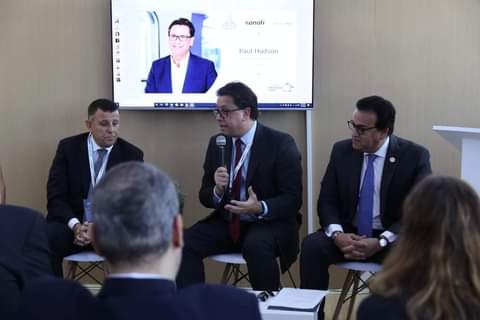بالصور .. نتائج الأثر البيئي للرعاية الصحية من خلال منظومة التطبيب عن بٌعد لخفض الانبعاثات الكربونية “نتائج الدراسة التجريبية

بالصور .. نتائج الأثر البيئي للرعاية الصحية من خلال منظومة التطبيب عن بٌعد لخفض الانبعاثات الكربونية
“نتائج الدراسة التجريبية”
محمود الهندي
خلال انعقاد مؤتمر المناخ “COP27” في شرم الشيخ، في منطقة الابتكار، أعلنت سانوفي بالتعاون مع جامعة عين شمس عن نشرأول دراسة من نوعها في مصر وأفريقيا للحد من انبعاثات الغازات الكربونيه من خلال التطبيب عن بعد، من خلال العيادات الافتراضية لأمراض الأكزيما التأتبيه والربو في مستشفى عين شمس الجامعي، بهدف تقليل الانبعاثات الكربونية الناتجه من رحلة المريض اثناء تلقى الرعاية الصحي وقامت شركة دى كاربون بتحليل نتائج الدراسة البيئية وتأثيرها على المناخ .
واثناء مشاركته في الجلسة النقاشية أعلن الاستاذ الدكتور خالد عبد الغفار وزير الصحة والسكان عن تبنى الحكومة المصرية التكنولوجيا الصحية من خلال منظومة الصحة الرقمية وذلك لدعم المناطق النائيه للوصول إلى المزيد من المرضى لتحقيق التكافىء بين أطراف المحفاظات فى الحصول على الرعاية الصحية وقد اثنى معاليه على جامعه عين شمس لتبنيها لتلك الدراسة الهامة بالتزامن مع استضافة مصر للنسخة رقم 27 من مؤتمر المناخ د لتحقيق أهداف الدولة للتنمية المستدامه لصحة المواطن المصرى .
وصرح أ.د. محمود المتيني، رئيس جامعة عين شمس “نحن ندرك التزامنا ببذل كل ما في وسعنا لمقاومة تغير المناخ من خلال تقليل الانبعاثات الكربونية لقطاع الرعاية الصحية في مصر ، نحن نعمل على تقليل الآثار البيئية المباشرة وغير المباشرة لأنشطتنا ولخدمات المرضى التي تهدف إلى المساهمة في تقليل الكربون من جانب الرعاية الصحية بما يتماشى مع رؤية مصرللتنمية المستدامه 2030م ويعكس دعم جامعة عين شمس للشركاء سانوفى ودى كاربون فى تطبيق هذا المشروع من خلال المستشفيات الجامعيه الى أهمية تبنى توفير الخدمة الصحه والحفاظ على البيئة معاً .
وقد صرح بوول هادسون رئيس مجلس ادارة شركة سانوفي العالميه نحن بحاجة إلى توفير اساليب جديدة لتقديم الرعاية الصحية مع تقليل الانبعاثات اثناء تلقى المريض للرعاية الصحية وتحقق ذلك من خلال تجربة التطبيب عن بعد بالشراكه مع جامعة عين شمس وشركة دي كاربون، وبالتالي تفتح سانوفي مصر آفاقا جديدة لزيادة الوعي حول الفرص المتاحه بتقليل الانبعاثات الكربونيه من أنظمة الرعاية الصحية .
تظهر النتائج المبدئيه فائدة التطبيب وتقديم الاستشارات الطبية عن بعد حيث انها لا تظهر فقط انخفاضا بنسبة 74 % في انبعاثات الغازات الكربونيه، ولكنها أيضا تقلل من عبء المرض لتحسين حياة المريض .
وتعتبر هذه الدراسة خطوة أولى مهمة لجمع البيانات التى تساعد في تحديد مسار الرعاية الصحيه لتحقيق الاستدامة في مصر وحول العالم”.
وقد حضر الجلسة النقاشية نخبه من القاده لقطاع الرعايه الصحية ، اللواء طبيب أحمد بهاء الدين زيدان، رئيس الهيئة المصريه للشراء الموحد، والدكتور تامر عصام رئيس الهيئة المصريه للأدوية ، دكتور حسام عبد الغفار أمين المجلس الأعلى للمستشفيات الجامعية ، مساعد وزير الصحة والمتحدث الرسمى لوزارة الصحة والسكان والدكتور أحمد السبكى رئيس الهيئة العامه للرعاية الصحية والمشرف العام على مشروع التامين الصحى الشامل .
خفض الانبعاثات الكربونية من شبكة الرعاية الصحية من خلال التطبيب عن بعد
تشارك سانوفي بخبرتها في استخدام الحلول المبتكرة لدمج العناصر الاجتماعية والبيئية في الرعاية الصحية لتحسين حياة المريض وتقليل العبىء المادي للوصول إلى الحد الأدنى من الانبعاثات الكربونيه اثناء رحلة للمريض لتلقى الرعاية الصحية .
الأولى من نوعها في الشرق الأوسط منصة التطبيب عن بعد لخدمة أمراض الرعاية المتخصصة ” الأكزيما التاتبية – الربو”
تم إطلاق مشروع العيادات الافتراضية من خلال المستشفيات العامه بالدمرداش أحد أعرق المستشفيات العامة الجامعية في مصر، ويهدف المشروع إلى تقليل الوقت المستغرق لتلقى الاستشارت الطبيه للأمراض المناعيه “الالتهاب من النوع الثاني” وذلك لتسهيل استشارة ومتابعة مرضى الأكزيما التاتبيه والربو لتجنب تنقل المرضى واستخدام طريق المواصلات، والاستفادة من الفوائد المشتركة المرتبطة بتنفيذ المشروع من خلال الحد من الانبعاثات الكربونيه الناجمة عن نقل المرضى من وإلى المستشفى .
وقد افادت الابحاث ان قطاع الرعاية الصحية عالميا مسؤول عن 5 % من إجمالي صافي الانبعاثات الكربونية ويمثل مسار رعاية المرضى أكثر من 45 % من هذا المجموع .
نتائج الأثر البيئي للرعاية الصحية من خلال منظومة التطبيب عن بعد لخفض الانبعاثات الكربونية
تشير نتائج الدراسة الأوليه التجريبيه نتائج الاثر البيئى لخفض الابعاثات من خلال تطبيق التطبيب عن بعد حيث اشارت ان 108 من مرضى الربو والأكزيما التاتبيه التحقوا بالعيادة الافتراضية حيث استخدام حوالي 73 % من المرضى سيارتهم الخاصة لزيارة المستشفى والـ 27٪ تنقلوا باستخدام وسائل النقل العام .
وقد أظهر النتائح التحليلة الأولي أن استخدام العيادة الافتراضية قلل من انبعاثات الغازات الدفيئة بنسبة 74.2 % مقارنة بالزيارات الشخصية الفعلية 24.035 “طن Co2eq في السنة في حالة الزيارات للمستشفى مقابل 6.275 طن CO2eq في السنة”
وتوقعت الدراسة أيضا التأثير إذا كان 100 % من المرضى قد استخدموا وسيلة نقل السيارة الخاصة – فإن الانخفاض المتوقع في انبعاثات غازات الدفيئة سيزيد إلى ~ 80 %
بجانب الحد من انبعاثات الغازات الدفيئة ، وهو أمر مهم لا غنى عنه ، يمكن أن يكون لاستخدام العيادات الافتراضية أيضا تأثير إيجابي على صحة المريض بسبب تحسين الامتثال للعلاج والمتابعة ، وتخفيف العبىء المادى للمرضى ، وزيادة التواصل ما بين الدكتور والمريض ممن يحسن من حالة المريض .
نحن في عصر جديد من الرعاية الصحية – ونحن بحاجة إلى الاستفادة من جميع مواردنا واكتشاف طرق جديدة لتقديم الرعاية الصحية للمرضى مع تخفيف التأثير على البيئة للحفاظ على المناخ. ونتطلع إلى مواصلة البرنامج التجريبي لجمع مزيد من المعلومات الهامة عن التأثير على الانبعاثات الكربونيه .
Environmental effect of healthcare Decarbonization Through Telemedicine (Pilot Study Results)
during COP7 taking place in Sharm El Sheikh, at the Innovation zone, Sanofi, the innovative global healthcare company, in collaboration with Ain shams university announce the publication of the first-of-its-kind in Egypt & Africa Greenhouse Gases (GHG) emissions reduction report resulting from Telemedicine, piloting Atopic Dermatitis & Asthma virtual clinics in Ain shams university Hospital, As part of its responsibility to decarbonize the healthcare through the patientcare pathway. The study technically is conducted by D-carbon according to environmental accounting standards and methods.
The panel discussion was privileged by the presence of His Excellence Prof. Dr. Khaled Abdel Ghafar, the minister of health who shared his view about the digital health and health tech in Egypt to reach patients in remote areas. During his contribution to the panel, he praised Ain Shams university in adopting the concept of telemedicine in its hospital to materialize the 2030 vision for sustainable healthcare confirming the important role that
Prof. Dr. Mahmoud El-Meteini,
President of Ain Shams University
“We are also mindful of our obligation to do everything we can to ensure a healthy planet,” said Prof. Dr. Mahmoud El-Meteini, President of Ain Shams University. As part of our commitment to supporting Egypt’s healthcare sector decarbonization, we are working to reduce the direct and indirect environmental impacts of our activities and patients’ services aiming at to contribute to decarbonize the healthcare inline with Egypt vision 2030. Therefore, the partnership with Sanofi and Dcarbon to establish a pilot for the virtual clinics reflects the university vision to implement sustainable healthcare services for the Egyptian patients while persevering the climate change to meet the UN goals for well being and climate action.
Paul Hudson
Chief Executive Officer, Sanofi
“We need to identify new ways to deliver care that improve outcomes while reducing emissions from the patient care pathway. By piloting a study on telemedicine with Ain Shams University and DCarbon, Sanofi Egypt is breaking new ground to raise awareness on the opportunities linked to the decarbonization of healthcare systems. Early results demonstrate the benefit of telemedicine, showing not only a 74% reduction in greenhouse gas emissions but also reductions in treatment burden which can lead to better compliance. It is an important first step in collecting real-world evidence that will help scale, in Egypt and across the world, sustainable patient care pathways.”
The panel discussion was attended by high level esteemed guest of honors, Major General Bahaa El-Din Zeidan is the Director of the Galaa Medical Complex of the Egyptian Armed Forces and Chairman of the Egyptian Authority for Unified Procurement, Medical Supply and Supply and Medical Technology Department (UPA), Prof. Dr. Tamer Essam, Chairman of Egyptian Drug Authority, Dr Hossam AbdelGhaffar , Deputy MOH and Dr Ahmed El Sobky, Head of Egyptian Healthcare Authority.
Healthcare decarburization through the tele-medicine
Sanofi is sharing its experience in utilizing innovative solutions to integrate social and environmental elements into the healthcare to reach more patients and reduce physical consultation to bring transportation GHG emissions to a minimum.
The first of its kind in the middle east tele-medicine platform to serve the specialty care diseases (Atopic Dermatitis – Asthma)baa
The Virtual Clinics project was launched in collaboration with Sanofi, and Ain Shams University (ASU) through its public hospital Al Demerdash, one of the most prestigious university public hospitals in Egypt, The project aims to reduce the time spent in referrals across different Type II Inflammation , to facilitate Atopic Dermatitis and Asthma patient virtual consultation and follow-up to avoid patient physical traffic, and to capitalise on the co-benefits associated with the project’s implementation by reducing GHG emissions caused by patients’ transportation to and from the hospital.
The healthcare sector is responsible for 5% of total net emissions and the patient care pathway accounts for over 45% of that total.
The study discussed the outcomes of the white paper of the GHG emissions impact of 108 asthma and atopic dermatitis patients at Ain Shams University who enrolled in the Virtual Clinic. Following an in-person consultation visit with their physician, the patients were followed using the Virtual Clinic.
Based on initial intake information, ~73% of patients travelled by private car to the hospital visit and ~27% travelled by public transportation.
Initial analysis showed that use of the Virtual Clinic reduced greenhouse gas emissions by 74.2% compared to physical in-person visits (24.035 ton Co2eq/year with in-person visits vs 6.275 ton CO2eq/year). The study also projected the impact if 100% of patients had previously travelled by private car- the projected reduction in GHG emissions would increase to ~80%.
Beyond the reduction in GHG emissions, which is significant, use of the Virtual Clinic can also have a positive impact on health outcomes due to better compliance and follow-up, financial impact to patients, greater reach.
We are in a new era of healthcare – we need to leverage all of our resources and explore new ways to deliver patient care that support patient outcomes while mitigating the impact on the environment.
We look forward to continuing the pilot program to gather important information on the impact on GHG emissions.









